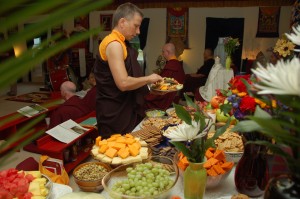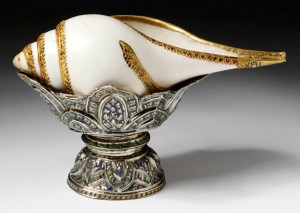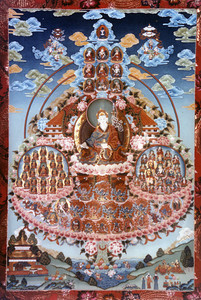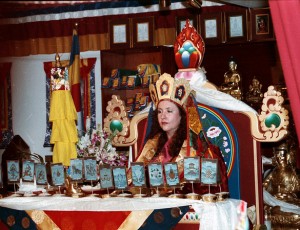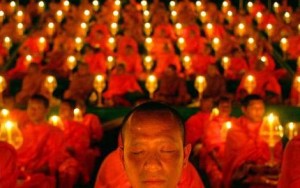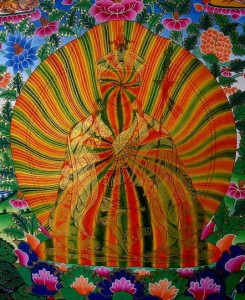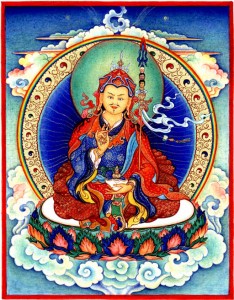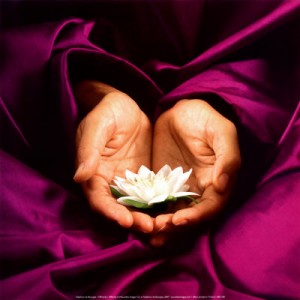
An excerpt from a teaching called The Seven Limb Puja: Viewing the Guru by Jetsunma Ahkon Norbu Lhamo on October 18, 1995
In the face of the Guru, which is always, we should always be making offerings. Do you make offerings when you come to temple? Nice, but not enough. Do you make offerings when you put water into the little bowls on your altars in the morning? Nice, but not enough. Do you make offerings of the first portions of your food? Great, but not enough. We should be making offerings constantly. But how can we do that? You think, “Oh, my hands are busy. I can’t always be making offerings.” Well, of course, most of the offerings, therefore, are going to be mental offerings. If we are making mental offerings appropriate to the information that I have just given you, which is that the Guru’s face is indistinguishable from our own nature, and that we are always in the presence of the Guru, then there should never be a moment that we do not make offerings. Now, what would that look like? How could you practice that way?
In the face of the Guru you must not grasp or cling to anything.
That means, if you smell something and it’s a delicious smell, you offer it immediately, rather than keeping it for yourself. You know how, when we smell food, we go (sniff sound) “Mmm Delicious! I’m keeping that; that’s mine! I get that!” So instead of that, you smell it, you enjoy it, and you offer the nectar of that to the Lama; every smell that you take in that is beautiful; even the smells that you take in that are not beautiful, you think of them as being instantly transformed into the very essence of bliss and offer that to the Guru. Offer everything that you see.
You know how we see things and say, “How beautiful! Good, I’ll take that!” We walk outside like we own the day. “Beautiful day! My eyes are drinking it in! I’m getting this!” That’s how we enjoy the day. We eat it, eat it, eat it. The habit of greed is so strong. Instead of doing that, remember that you are in the presence of the Guru constantly; that the Guru literally abides within your channels, winds and fluids, within your psychic spiritual inner structure. That nature which is your nature IS the Guru. So whenever you see something with your eyes that is beautiful, instantly offer your eyes, offer the vision, offer the feeling, offer the pleasure to the Lama, to the holy one who has crossed the ocean of suffering for your sake. Instantly offer it up.
Eventually, you get into a habit. At first it’s like, “I saw that!” Quick, “Okay, I saw that! Okay!” In the beginning we get a little spastic and a little nuts. But, later on, it becomes a natural, graceful, spontaneous movement. You actually change the way your perception works. It takes a little time, it takes some practice, but there will come a day when naturally you do not cling to your sight. Yes, you see; yes, it registers in your brain; yes, your pupils and your irises and all those things work just right, but the difference is that there is a kind of graceful offering up that naturally occurs. It’s as though you didn’t grab onto everything in front of you. Eventually it becomes a natural, graceful movement of offering.
Do you remember when you first started practicing Bodhicitta and you didn’t feel like it? It was like, “Yeah, I’m grateful to all motherly sentient beings. May they all rest in peace.” in the same tone of voice that you would say, “Rot in hell!” That’s the kind of thing we did when we first started practicing Bodhicitta and we didn’t have the habit of it. I watched; I saw it. And then, after a time it became more natural, didn’t it? It becomes more natural to think kindly, to think of compassion regarding other sentient beings. It’s like that now with your perception. You make offerings constantly to the Buddhas and Bodhisattvas, and to the Lama who embodies all the objects of refuge. Anything that you receive, consistently offer. It doesn’t mean that you don’t get to keep it. I mean if it disappears in front of you, I would take that as a sign that somebody wanted it! Please understand that we are not looking at this in a limited, superficial way! We know that the Buddhas and Bodhisattvas don’t actually need our offerings. They are content and complete. They are perfect. So when we offer to the objects of refuge we are doing so for our sake, not for their sake. Isn’t that true? So, of course, you think in that way. Obviously then, if you make an offering, it probably won’t disappear! But you never know!
You get in the habit of thinking that whatever you have, “Ultimately belongs to the Buddhas and the Bodhisattvas. Ultimately, everything that I own I have given.” There is this posture that naturally occurs over time of peacefulness and lack of tension regarding personal possessions. We begin to think that it’s already been offered and therefore, there’s nothing to cling to. And so, slowly, slowly, over time, we develop that habit and the habit becomes very real. Our minds become very smooth and more joyful. It isn’t having that makes us joyful, it’s freedom from the need to have that makes us happy.
Therefore, we make constant offerings because we are constantly in the presence of the Guru and we should think like that. We should actually think that here, in the presence of the primordial empty nature, non-dual as the display of luminosity, here in the presence of the fundamental Bodhicitta, the miraculous Bodhicitta, the unbelievably potent, pure uncontrived Bodhicitta, it is simply not appropriate to cling and grasp. It becomes filthy and disgusting.
Suppose Guru Rinpoche were sitting right in front of you, and there was some tea or some food put in front of you. Would you say, “Gimme, gimme?” I mean, how could you even think of eating with Guru Rinpoche in front of you? You would offer, “Please take, please, take everything. Please take everything that I have! Please eat. Please let me offer this to you!” You must think that, in fact, that is the case. That the precious Bodhicitta is always with us, that the Lama is always with us, and so it is never appropriate to grasp; it is never appropriate to keep for ourselves what should naturally be offered. In this way, we get ourselves into the habit and the grace of constant offering.
© Jetsunma Ahkön Lhamo
